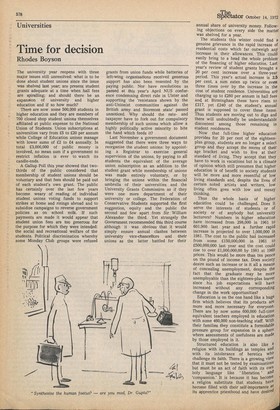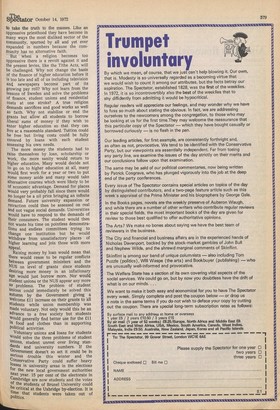Universities
Time for decision
Rhodes Boyson
The university year reopens with three major issues still unresolved: what is to be done about student unions since the issue was shelved last year; are present student grants adequate at a time when hall fees are spiralling; and should there be an expansion of university and higher education and if so how much?
There are now some 500,000 students in higher education and they are members of 700 closed shop student unions themselves affiliated at public expense to the National Union of Students. Union subscriptions at universities vary from £5 to £20 per annum while College of Education unions manage with lower sums of £2 to £4 annually. In total £3,000,000 of public money is involved, no mean sum if a government to restrict inflation is ever to watch its candle-ends.
A Gallup Poll this year showed that twothirds of the public considered that membership of student unions should be voluntary and that fees should be paid out of each student's own grant. The public has certainly over the last few years become weary of reading of individual student unions voting funds to support strikes at home and risings abroad and to subsidise campaigns to reverse government policies as on school milk. If such payments are made it would appear that student union fees are boo generous for the purpose for which they were intended: the social and recreational welfare of the students. Political discrimination whereby some Monday Club groups were refused grants from union funds while batteries of left-wing organisations received generous support has also been resented by the paying public. Nor have resolutions as passed at this year's April NUS conference condemning direct rule in Ulster and supporting the 'resistance shown by the anti-Unionist communities against the British army and Stormont state' passed unnoticed. Why should the rateand taxpayer have to fork out for compulsory membership of such unions which allow a highly politically active minority to bite the hand which feeds it?
Last November a government document suggested that there were three ways to reorganise the student unions: by appointing a Registrar to exercise general supervision of the unions, by paying to all students the equivalent of the average union subscription as an addition to the student grant while membership of unions was made entirely voluntary, or by bringing the unions within the financial umbrella of their universities and the University Grants Commission as if they were one more department of their university or college. The Federation of Conservative Students supported the first suggestion, equity and the public the second and few apart from Sir William Alexander the third. Yet strangely the Government recommended this third course although it was obvious that it would simply ensure annual clashes between university vice-ohancellors and their unions as the latter battled for their annual share of university money. Following objections on every side the matter was shelved for a year.
The students this winter could find a genuine grievance in the rapid increase of residential costs which far outweigh any increase in their allowances. This could easily bring to a head the whole problem of the financing of higher education. Last year's review of student grants brought a 20 per cent increase over a three-year period. This year's actual increase is 3.5' per cent, a sum eaten up twice or even three times over by the increase in the cost of student residence. Universities are charging up to £280 per annum in hall fees and at Birmingham these have risen to £317, yet £240 of the student's annual grant is supposed to cover these items. Thus students are moving out to digs and there will undoubtedly be understandable discontent among those remaining in student residences.
Now that full-time higher education provides for 20 per cent of the eighteen plus group, students are no longer a select group and they accept the mores of their age bracket and wish to live at their standard of living. They accept that they have to work in vacations but in a climate of opinion which still presumes that higher education is of benefit to society students will be more and more resentful of low living standards and, despite the lives of certain noted artists and writers, low living often goes with low and messy thinking.
Thus the whole basis of higher education could be challenged. Does it serve the interests of students or of society or of anybody but university lecturers? Numbers in higher education have increased from 298,000 in 1961 to 601,900 last year and a further rapid increase is projected to over 1,000,000 in 1981. The cost to the public hag increased from some £150,000,000 in 1961 to £500,000,000 last year and the cost could rise to over £1,000,000,00 by 1981 at 1969 prices. This would be more than ten pence on the pound of income tax. Does society desire such an increase or is it all a means of concealing unemployment, despite the ( fact that the graduate may be more unemployable than the eighteen-plus leaver since his job expectations will have increased without any corresponding change in the work opportunities?
Education is on the one hand like a huge firm which believes that its products are more and more necessary for everyone. There are by now some 600,000 full-time equivalent teachers employed in education with some 460,000 non-teaching staff. With their families they constitute a formidable pressure group for expansion in a sphere where assessments of usefulness are made by those employed in it.
Structured education is also like 3 religion with its buildings as temples and with its intolerance of heretics wh° challenge its faith. There is a growing vieW that it must not be tested by examinations but must be an act of faith with its oWil holy language like 'liberation ' an° 'compassion.' It is because it has become a religion substitute that students have become filled with their self-importance as, its apprentice priesthood and have desire°
to take the truth to the masses. Like an Oppressive priesthood they have become in many ways the most disliked sector of the community, spurned by all and yet ever expanded in numbers because the community has no alternative faith.
But when a religion becomes too Oppressive there is a revolt against it and the present levies, like the Tithe Acts, will be challenged. Why not change the basis of the finance of higher education before it IS too late and all of us including television and newspapers become part of its growing pay roll? Why not learn from the lessons of Sweden and solve the problems of finance, student unions and residential costs at one stroke? A true religion demands sacrifices and good works as well as faith. Why not stabilise or end the grants but allow all students to borrow liberal sums of money if they wish to enter higher education so that they can live at a reasonable standard. Tuition could be free but living costs could be fully covered by loans with each student assessing his own needs.
The more money the students had to raise themselves by loan, scholarship or Work, the more sanity would return to higher education. Many would decide not to go on to higher education at all, many would first work for a year or two to put some money aside and many would take alternative courses which were likely to be of economic advantage. Demand for places Would very probably fall since there would no longer be a nil price bringing an infinite demand. Future university expansion or retraction could then be assessed on real and not vague social demands. Universities Would have to respond to the demands of their consumers. The student would then not waste his time on pointless demonstrations and endless committees trying to Change one institution but he would Withdraw from unsatisfactory places of higher learning and join those with more appeal.
Raising money by loan would mean that there would cease to be regular conflicts between government ministers and the NUS on level of grants since students desiring more money in an inflationary age would just borrow more. Nor would student unions or the NUS appear any more as Problems. The problem of student Unions could immediately be solved this autumn by the Government giving a Welcome Ell increase on their grants to 'all students while union membership was
made voluntary. Not only would this be an advance to a free society but students Would generally find better use for the Ell in food and clothes than in supporting political activities.
Voluntary unions and loans for students Would solve the three problems of student unions, student unrest over living stan
dards and university numbers. If the Government doesn't so act it could be in
serious trouble this winter and the
Conservative Party could suffer heavy 'fosses in university areas in the elections or the new local government authorities next year. 15 per cent of the electorate in
Cambridge are now students and the votes 9f the students of Brunel University could ne critical at the Uxbridge by-election. It is time that students were taken out of Politics.















































 Previous page
Previous page